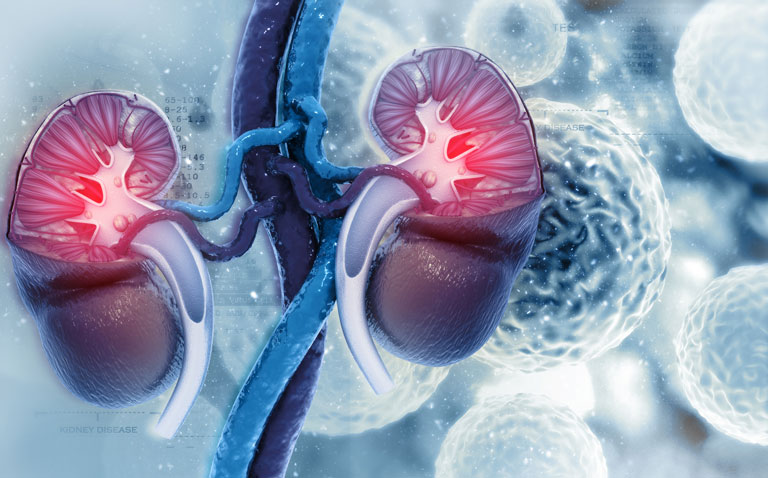Merck and Pfizer have announced that the European Commission has approved Bavencio® (avelumab) in combination with axitinib for the first-line treatment of adult patients with advanced renal cell carcinoma (RCC).
The approval was based on positive interim results from the Phase III JAVELIN Renal 101 study, which demonstrated that Bavencio, a PD-L1 inhibitor in combination with axitinib (a VEGF inhibitor) significantly lowered risk of disease progression or death by 31% (HR: 0.69 [95% CI: 0.574–0.825; p<0.0001]) and nearly doubled the objective response rate (ORR; 52.5% [95% CI: 47.7-57.2] vs. 27.3% [95% CI: 23.2-31.6]) compared with sunitinib in patients with advanced RCC irrespective of PD-L1 status.
“Advanced kidney cancer has a devastating impact on patients’ quality and longevity of life and there is an unmet need to improve on the current available treatment and treat this disease with newer drugs,” said Dr Balaji Venugopal, Honorary Clinical Senior Lecturer, University of Glasgow. “Avelumab, a novel immunotherapy, in combination with axitinib has demonstrated clinically significant and meaningful improvements in efficacy by extending the time without worsening of cancer and causing tumour shrinkage, along with a generally manageable safety profile compared to currently available treatment. Notably this benefit is seen in all prognostic risk groups in patients with advanced renal cell carcinoma and can help healthcare professionals optimise their patients’ treatment. Today’s approval is a step in the right direction and it is exciting to be able to treat our patients first-line with this novel combination to improve outcomes for our patients.”
Since the early 1990s, kidney cancer incidence rates have increased by almost 87% in the UK and it is expected to be one of the fastest growing cancers over the next decade due to a range of factors including the UK’s aging population, smoking and the rise in obesity. More than 12,000 people are diagnosed with RCC in the UK each year and it is now the seventh most common cancer in British adults.
Approximately 40% of patients are first diagnosed with RCC at the advanced stage, and 30% of patients treated for an earlier stage go on to develop metastases. About half of patients living with advanced RCC do not go on to receive additional treatment after first-line therapy, for reasons that may include poor performance status or adverse events from their initial treatment. The five-year survival rate for patients with metastatic RCC is approximately 12%.
Nick Turkentine, CEO of Kidney Cancer UK said: “RCC is the most common type of kidney cancer, accounting for over 80% of all cases of the disease. Around 4500 kidney cancer deaths occur in the UK every year and people with advanced RCC have typically faced very poor outcomes. There is a considerable need for more treatment options, and we are pleased this new treatment for advanced RCC has been approved to be used in the UK. It’s important that it is now made available to patients who need the treatment as soon as possible.”
“Approval of the combination of Bavencio with axitinib for people with advanced RCC across all prognostic groups, allows patients to benefit from both an anti-PD-L1 immunotherapy combined with a VEGF inhibitor in first line,” said Belinda Byrne, Medical Director, Merck UK & Ireland “our focus now is to work with funding bodies across the UK to ensure patients have access to this much needed treatment option.”
“The European Commission approval of Bavencio in combination with axitinib has the potential to bring new first-line treatment options to patients living with advanced renal cell carcinoma,” Olivia Ashman, Oncology Medical Director, Pfizer UK. “Pfizer has been developing treatments for patients with kidney cancer for over a decade and, through the Alliance with Merck, will continue to help fight against advanced forms of this disease.”
The National Institute for Health and Care Excellence (NICE) technology appraisal for avelumab in combination with axitinib for untreated advanced or metastatic renal cell carcinoma is in development. The first committee meeting is scheduled for 15 January 2020, and the expected publication date for the final appraisal document is 08 April 2020.










